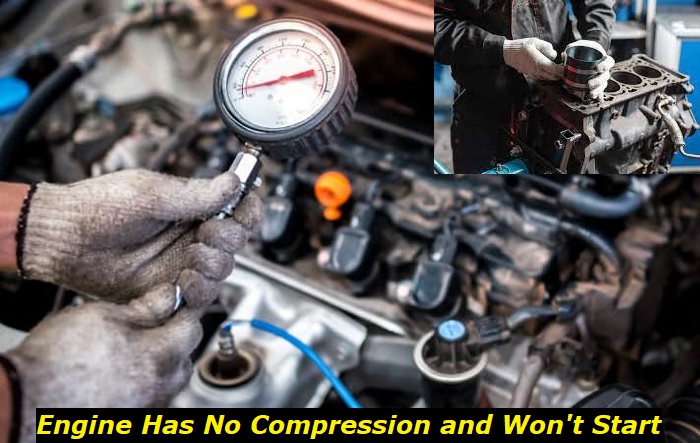Compression is one of the key conditions that allow the internal combustion engine to work properly. Only if the compression in a certain cylinder is completely OK, it may ignite the fuel and burn it the way it's needed for producing certain power. If the compression is higher or lower than initially planned for this certain engine, the powerplant won't work well. If there is no compression, you will not even be able to start the engine.
Compression problems highlights
- Level of importance:Medium
- Commonreasons:No oil film, worn-out compression rings, valve issues, cracks, head gasket issues
- DIY inspection:Possible
- DIY repair:Sometimes, possible
- Price for repair:$10 - $2,500
- Can you drive?Only if the engine starts
- Ways to fix:Inject oil into cylinders, check head gasket, check valve system, check compression rings

Engine with no compression - common symptoms
The cylinder forms one closed and isolated space with the combustion chamber when the valves are closed. When the piston moves up, it created certain pressure. The amount of this pressure is the compression - as simple as that. But when this space is not completely isolated, the compression falls. For example, something in the valve system lets some air out of the combustion chamber. This will lead to loss of compression in one cylinder.
This means that all other processes will not be OK and the fuel will not be burned completely or at all. Even understanding this process, you may come up with some signs of low compression in one or several cylinders in the engine:
- the changed starting sound of the engine (it becomes uneven);
- the vibration of the engine when it's started;
- long start - you will need to crank for quite a long time;
- harsh work of the engine with different sounds and other problems;
- unstable idle - the RPM may be low or jumping all the time;
- loss of power - the engine will seem like working at half of its capabilities;
- stalling - in bad situations, the engine may stall when you stop at a light.
There are other symptoms, too, but these ones may be applied to all engine types. Once one or several of the cylinders lose part of their standard compression, you will not overlook this.
But this is not the worst possible situation. If your engine loses compression completely, it will develop other symptoms that will obviously disappoint you. Here are some of them:
- no start - however long you crank the engine, it will not start and will obviously not drive you anywhere;
- strange sound when you crank the engine - while normally it's something like the interval sound, the no-compression engine sounds smooth, with no intervals;
- the smell of gasoline - when you try starting such an engine for a long time, you will smell gas in your vehicle and around it;
- dying battery - after some tries, you will understand that the battery is about to be dead.
There is just no power to push the piston and this leads to a complete engine failure. If you hear this smooth sound with no intervals when you are trying to start the engine, you may give up even trying. The engine needs some repair, so there is no need to torture the battery.
What are the reasons for complete compression loss in the engine?
Although the majority of reasons are pretty complicated to locate and repair, some obvious reasons are not so tough to investigate even if you don't have a lot of experience as a car mechanic. It's not always the disastrous breakdown of your engine and you should understand this.
We'll start with easier reasons that you can diagnose by yourself and move to more complicated issues.
Here they are:
1. No oil on cylinder walls
After your engine was standing still for a week or more, the oil may have gone down to the oil pan. It means that the cylinder walls are dry and have no oil film. In such cases, many engines may develop a no-compression issue. This means that when you will be trying to start the engine, it will sound smooth and won't start.
The cure for this problem is to sprinkle some oil to the cylinders through spark plug holes. However, this is not the best technical advice we can give you in our blog and some mechanics will facepalm at this moment, we are pretty sure this will help you start the engine after a long no-work period. After you add some oil through the spark plug holes, rotate your engine using a tool that you can insert into the crankshaft from the side.
This will add the needed oil film into the cylinder block and you will be able to start the engine. Of course, this will only work if there are no other serious damages to your engine.
2. Head gasket failure
One more common reason why your engine has no compression in some or all cylinders is the failed head gasket. This one is harder to locate because you don't see this part. And to inspect it, you will need to take the engine head off which is a task for professionals only. But you may notice some other side effects when the gasket is dead:
- white or black smoke from the exhaust when the engine works;
- quickly the falling level of coolant or oil in the engine;
- harsh work with one or two cylinders not working or working very harshly;
- vibration and shaking of the engine;
- check engine light covering the code that says about the misfiring engine;
- there is an oily film in the coolant reservoir;
- the oil in the engine is white and foamy.
The head gasket may cause fluid leaks inside the engine. For example, the coolant may get into the combustion chamber or oil may leak into the cylinders from above. This means that this oil or coolant will burn and produce intensive smoke from the exhaust. Also, liquids may mix and go through inadequate reactions forming foam, changing colors, etc.
The only possible repair is to replace the failed head gasket.
3. Head problems
There may be no compression in your engine or in some parts of it if some of the valves are failed. It means that the valves can't close completely to hold the pressure and the air leaks through the valves. Because of this, the compression can't build up in one or several cylinders.
This may happen because of carbon buildup, valve deformation, head deformation because of overheating, valve contamination, valve seal problems, etc. Diagnosing is possible after taking off the head and checking the valve system.
It's quite hard to locate and fix this issue unless you are an experienced mechanic.
4. Piston or cylinder issues
One more possible reason for the no-compression issue is some problem in the cylinder block. The compression is created by the piston that comes up and presses the air-fuel mixture. But for this, the piston shouldn't be leaking. Leaks may be caused by basically three things: cracked piston, cracked cylinder wall, or failed piston rings. The latter is the most possible reason.
Each piston has two sets of rings. The first set has oil rings while the second one has compression rings. If oil rings fail, some oil will always leak into the combustion chamber and burn. But if compression rings fail, there will just be no compression and the certain cylinder will not work.
Repairing these problems is very complicated. This requires taking the engine apart and sometimes it's actually cheaper to replace the engine or even to replace the car.
When is it worth repairing your engine if it has no compression?
At first, you may want to try the trick with the oil in cylinders that we've told you above. Maybe, you will be able to start the engine. Also, you may want to check the head gasket. Its replacement is not cheap, but it's way cheaper than replacing the engine.
If the problem is in the cylinder block or head and the mileage of your engine is over 200,000 miles, in most cases, repairing such a powerplant will not be very wise. You will spend a lot of money to just take the engine apart and diagnose it. And then you will spend another pile of money to have it repaired.
If you can do this by yourself, then you may try. Maybe, replacing cheap piston rings or cleaning valves will do the trick for your vehicle. But if the damage is more serious like a crack in the head or in the engine block, engine replacement will seem like a better option.
About the authors
The CarAraC research team is composed of seasoned auto mechanics and automotive industry professionals, including individuals with advanced degrees and certifications in their field. Our team members boast prestigious credentials, reflecting their extensive knowledge and skills. These qualifications include: IMI: Institute of the Motor Industry, ASE-Certified Master Automobile Technicians; Coventry University, Graduate of MA in Automotive Journalism; Politecnico di Torino, Italy, MS Automotive Engineering; Ss. Cyril and Methodius University in Skopje, Mechanical University in Skopje; TOC Automotive College; DHA Suffa University, Department of Mechanical Engineering






Add comment